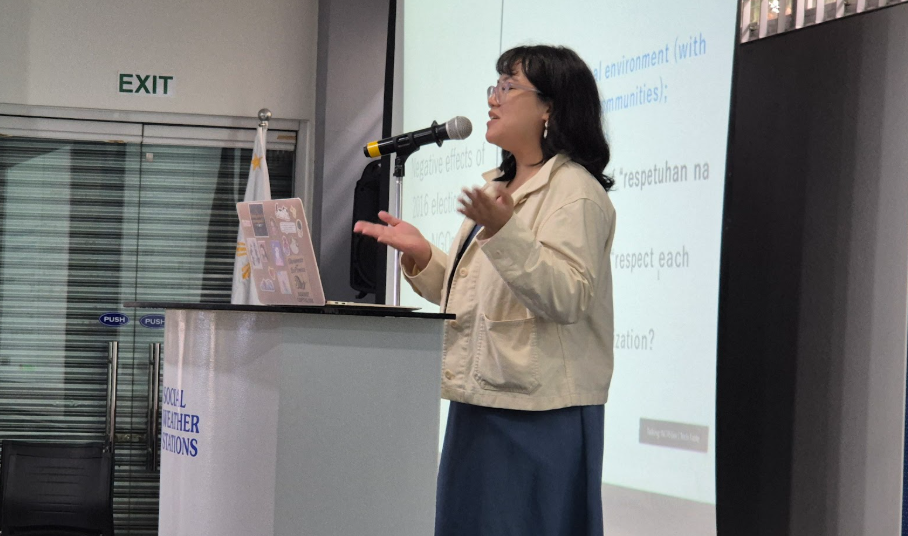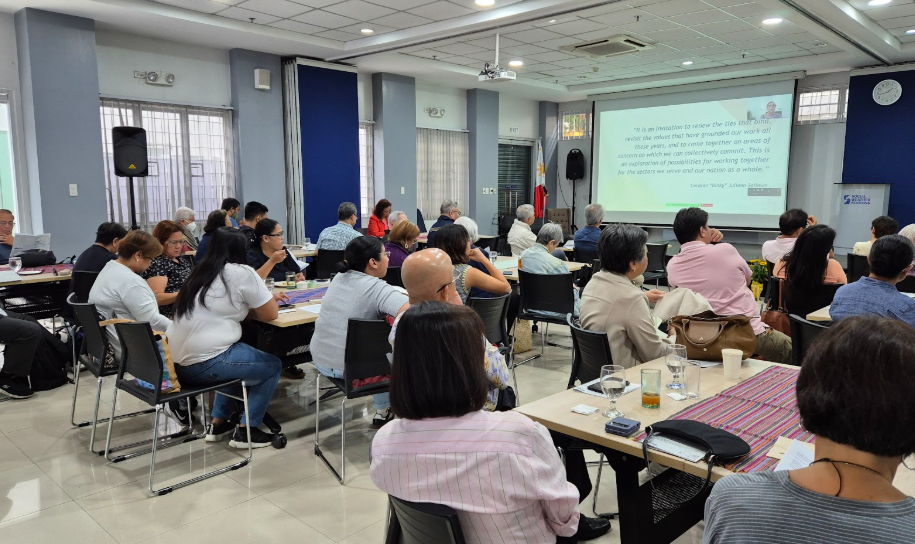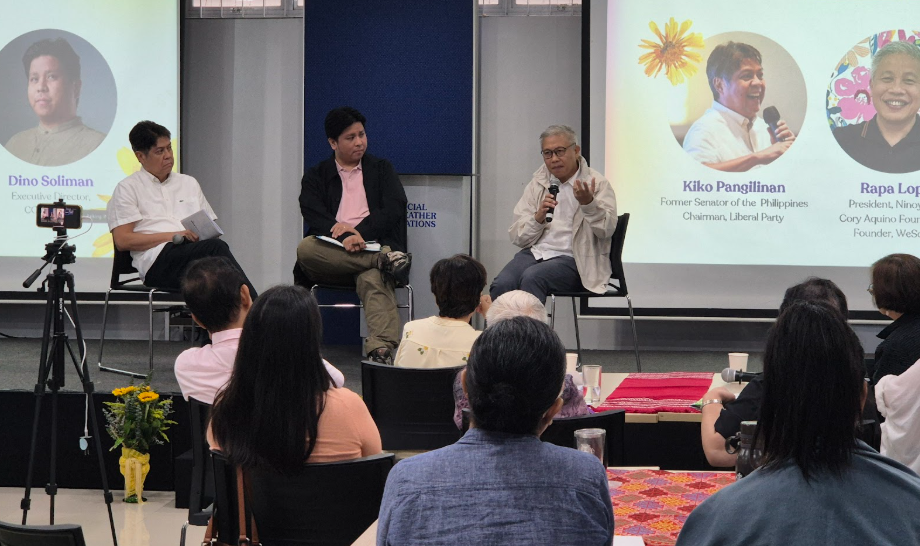Representatives from civil society organizations (CSO) gathered on the third death anniversary of Corazon "Dinky" Juliano-Soliman on Sept. 19 to discuss lessons learned from the splintering of the sector in the aftermath of the 2016 elections.
Beatriz Beato, a researcher from the Institute of Philippine Culture (IPC) at the Ateneo de Manila University, shared the themes and findings of the final report, "The Point of No Return for CSOs: Generative Conversations Toward Collaborative Action."

Beato presents the key themes and findings of the report, "The Point of No Return for CSOs: Generative Conversations Toward Collaborative Action," to CSO members present during the 2nd Corazon Juliano-Soliman Memorial Lecture.
The International Center for Innovation, Transformation, and Excellence in Governance (INCITEGov) partnered with the Caucus of Development NGO Networks (CODE-NGO) to conduct 12 interviews and focus group discussions (FGDs) with various CSOs from across Luzon, Visayas, and Mindanao. INCITEGov also partnered with RLR Research and Analysis, Inc., to conduct 11 more conversations with basic sector groups and current and former Duterte supporters.
The initiative aimed to better understand the participants' perspectives on the 2016 elections, their desired qualities in leaders, their current situation (e.g., lockdown, online work), and prospects for the 2022 elections. Soliman, who previously served as Social Welfare and Development secretary, led and facilitated the sessions before her untimely death in 2021.
"The Conversations represent an invitation to renew the ties that bind, to revisit the values that have grounded our work all these years, and to come together around areas of concern for which we can collectively commit," the report quoted Soliman.
INCITEGov engaged the IPC as research partner to compile, analyze, and draw out the research conclusions to produce a final report.
A fractured network
The 2016 election victory of former president Rodrigo Duterte led to "serious" division within the NGO space, with some Mindanao- and Visayas-based groups supporting the administration. This was exacerbated by the rise of populism and disinformation networks on social media.
Beato said the different perspectives strained once-solid working partnerships and friendships, resulting in mal-fractions across CSO networks that were historically focused on "Imperial Manila."
One participant said, "This has had serious repercussions on our ability to engage most effectively in our work and move forward as an effective countervailing force to government, a role CSO's have traditionally fulfilled."
Another said, "'We became aware of our inability to converse sensibly with our partners on the ground. It highlighted differences in literacies. It challenged our knowledge to read political junctures. In politics there is a tipping point, a point of no return.'"
Shrinking participation
The passive mindset "Respetuhan na lang" (Let's just respect one another) was used to avoid or freeze discussions, and preserve the working relationship. It became a shorthand to "Let's just try to stop, let's avoid the difficult conversation by moving along."
Beato said, "There was this notion that there are positions that are not to be taken, or positions that are not as divisive because they didn't want to alienate members, or they did not want to alienate members of the network who were from Mindanao in particular." Adding to the regional partisanship is the surge of information on social media, including false and misleading information.
As a result, there were topics considered "safe" such as disaster risk and reduction management, women, children, social development, and those that were "off-limits" such as extrajudicial killings (EJKs), war on drugs, and human rights.

Dr. Mary Racelis shares how Dinky came up with and led the generative conversations in 2020.
Alternatives to charismatic leaders
Apart from the polarizing information environment, the report revealed the importance of branding for political candidates. Being approachable, pro-poor, and competent were the most ideal characteristics for CSOs, while being hardworking, "madiskarte," and competent were for basic sectors.
But Beato stressed that these are "not all equal." A candidate can "get things done," but not be perceived as "approachable."
Part of Duterte's success, for example, is his branding "Change is Coming." Notably, for the basic sectors, one ideal quality of a leader is "fatherly."
One former Duterte supporter said, "Nabudol tayong lahat ng sumuporta kay Duterte [All of us who supported Duterte have been double-crossed], pero sino yung [but who is the] alternative or who would have actually been the alternative?"
According to Beato, this poses a challenge to CSOs, who must "offer concrete alternatives instead of being fault finders."
"The challenge in these conversations was for organizations to have a basis for deciding leaders based on evidence, or how to develop an organizational stance in engaging with these issues," she added.
Among the ways forward for the upcoming 2025 midterm elections include CSOs reconnecting with coalitions, networks, and basic sector communities through online and offline efforts, seeking accountability for human rights violations, as well as playing an active role in the political aspects of a democracy.
"The ball is now in the CSO court," Beato said.

(L-R) Former senator Francis "Kiko" Pangilinan, CODE-NGO executive director Sandino Soliman, and Angat Pinas, Inc. trustee and WeSolve Foundation president Rafael Lopa lead the panel discussion and reflection on the findings of the report.
In response, Angat Pinas, Inc. trustee and WeSolve Foundation President Rafael Lopa said the findings from the generative conversations served as a "reality check" for civil society, especially in tackling the nuances of EJKs and vote-buying issues. "When you see these wicked problems and you see the actual situation of our people, then you see ang daming nagkakadikit na problema at maraming posisyon [a lot of the problems are interconnected and there are various approaches] of solving these problems," Lopa said.
Former senator Francis "Kiko" Pangilinan added that social media has bred toxicity and is devoid of meaningful conversations due to disinformation from the "loudest voices."
After holding dialogues with 114,000 households in 100 districts under the Liberal Party's "Project Makinig," then-party president Pangilinan shared that many Filipinos do not consider themselves "political" since they "are just too exhausted with trying to keep their heads above the water."
"They have no time to discern. By and large, they're just out there trying to survive, to make ends meet," he said.
To address this, Pangilinan emphasized the need for creative ways of communicating with the public-such as through short films, movies, and documentaries" while deepening awareness on issues.
Given the "genuine shift" in narratives from the Duterte to the Marcos administration in mainstream conversations, the panel reminded the roles of civil society networks and political parties in dealing with the emotional aspects of politics after elections.
CODE-NGO executive director Sandino Soliman said the organization is currently at a point of "renewal," noting that some of its member networks have faced struggles because of the COVID-19 pandemic and funding pressures. However, he said the advocacy group's mandate of creating an enabling environment for its 12-member network to thrive remains.
This means being open to partnerships and collaborations with political parties that share the goal of influencing public policy.
"I think kailangan lang siguro kaming magpaigting pa ng pagsasanay [s]a ating members paano sila maging mas mahusay - 'yung engagement nila doon, maka-create ng opportunities para sa local governance," said Dino, son of the late Dinky Soliman and also a founding trustee of INCITEGov.
[I think we just need to further enhance our members' capacity to engage with these groups, as well as create opportunities for local governance.]